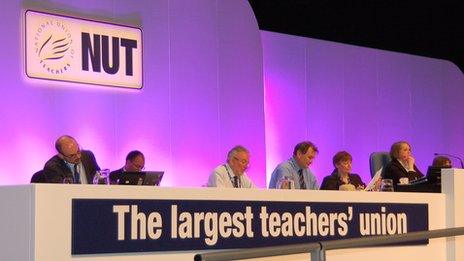NUT conference puts summer strike vote on hold
- Published

The National Union of Teachers has stepped back from a major escalation of industrial action in England and Wales this autumn - but it could still go ahead with a one-day summer strike.
The NUT's conference rejected a more hardline proposal for four days of strikes in the autumn, but has still to decide whether to walk out in June.
The strike calls are part of a campaign over teachers' pay and workload.
The government said strikes would "damage the profession's reputation".
"Ministers have met frequently with the NUT and other unions and will continue to do so," said a spokeswoman for the Department for Education.
"Further strike action will only disrupt parents' lives, hold back children's education and damage the reputation of the profession," she said.
'Maximum pressure'
During the debate, the union's treasurer, Ian Murch, likened Education Secretary Michael Gove to a "demented Dalek on speed who wants to exterminate anything good in education that's come along since the 1950s".
Delegates at the conference in Brighton did not support calls for an intensified campaign of strikes in the autumn, but there was not enough time to vote on the proposals for industrial action including a one-day strike in the week beginning 23 June.
A decision on this motion, which could still keep an option open for a further escalation, will be delayed until later in the weekend conference.
Jerry Glazier of the union's executive told the conference: "We must put maximum possible pressure on Gove and the coalition government to radically change their damaging policies towards education, their damaging policies towards teachers and their damaging policies towards children."
There are GCSE and A-level exams scheduled to be taken on the first three days of the week of proposed strike action in June.
But the union's general secretary, Christine Blower, said strike action "will not disrupt exams" and that any staff who need to supervise an exam will be given exemptions from taking part in industrial action.
The conference motion also called for a national demonstration, a lobby of Parliament and a broad-based campaign to challenge the government's education policy.
"Teacher morale is at a dangerously low ebb," said Ms Blower.
"Changes to pay, pensions and a working week for many teachers of 60 hours is driving many out of the profession."
The NUT conference delivered an "unsatisfactory" verdict on Ofsted in an earlier debate - backing a motion which said it should be "thrown into the dustbin of history".
"Snapshot 20-minute inspections by inspectors who often do not have relevant qualifications or recent teaching experience cannot be giving a true reflection of the work of schools or individual teachers," said Ms Blower.
The NASUWT teaching union, also holding its annual conference, is expected to reaffirm its commitment to industrial action in a debate on Sunday.
The union joined the NUT in a series of regional strikes in the past year but did not take part in last month's national strike.
General secretary Christine Keates said: "NASUWT members remain committed to maintaining and, if necessary, escalating the current industrial action campaign, including moving to further strike action."
Top graduates
A Department for Education spokeswoman rejected the need for strike action and said that changes to pay and conditions gave greater flexibility to heads and teachers.
"We know that the vast majority of our teachers and school leaders are hardworking and dedicated professionals. That is why we are giving teachers more freedoms than ever and cutting unnecessary paperwork and bureaucracy.
"In fact, teaching has never been more attractive, more popular or more rewarding. A record number of top graduates are now applying to become teachers and there have never been more teachers in England's classrooms, with a rise of 9,000 in the last year.
"It is important that teachers work closely with school leaders to ensure that their workload is manageable. We trust the professionalism of our head teachers to monitor their staff's workload and address any issues."
- Published19 April 2014
- Published19 April 2014
- Published19 April 2014